Construction Contract Law: Custom Street Hotel Ltd v Plus Case Study
VerifiedAdded on 2023/04/04
|13
|3220
|142
Case Study
AI Summary
This case study provides a detailed analysis of the Custom Street Hotel Ltd v Plus Construction NZ Ltd case, focusing on issues of contract repudiation, lawful termination, and suspension of works following non-payment. The analysis delves into whether Plus Construction was justified in terminating the contract due to non-payment by Custom Street, referencing the Construction Contracts Act 2002, NZS 3910, and the Contract and Commercial Law Act 2017 (CCL Act). The Court of Appeal's decision, which favored Plus Construction, is examined, highlighting the contractor's right to suspend work and terminate the contract under specific conditions. The study also contrasts liquidated and unliquidated damages in construction contracts, discussing their implications and the importance of clearly defining terms in agreements. It further explores general damages and liquidated damages, assessing their practicality and appropriateness in construction contracts, emphasizing the need for parties to understand the nature of their agreements to determine the most suitable damage remedy.
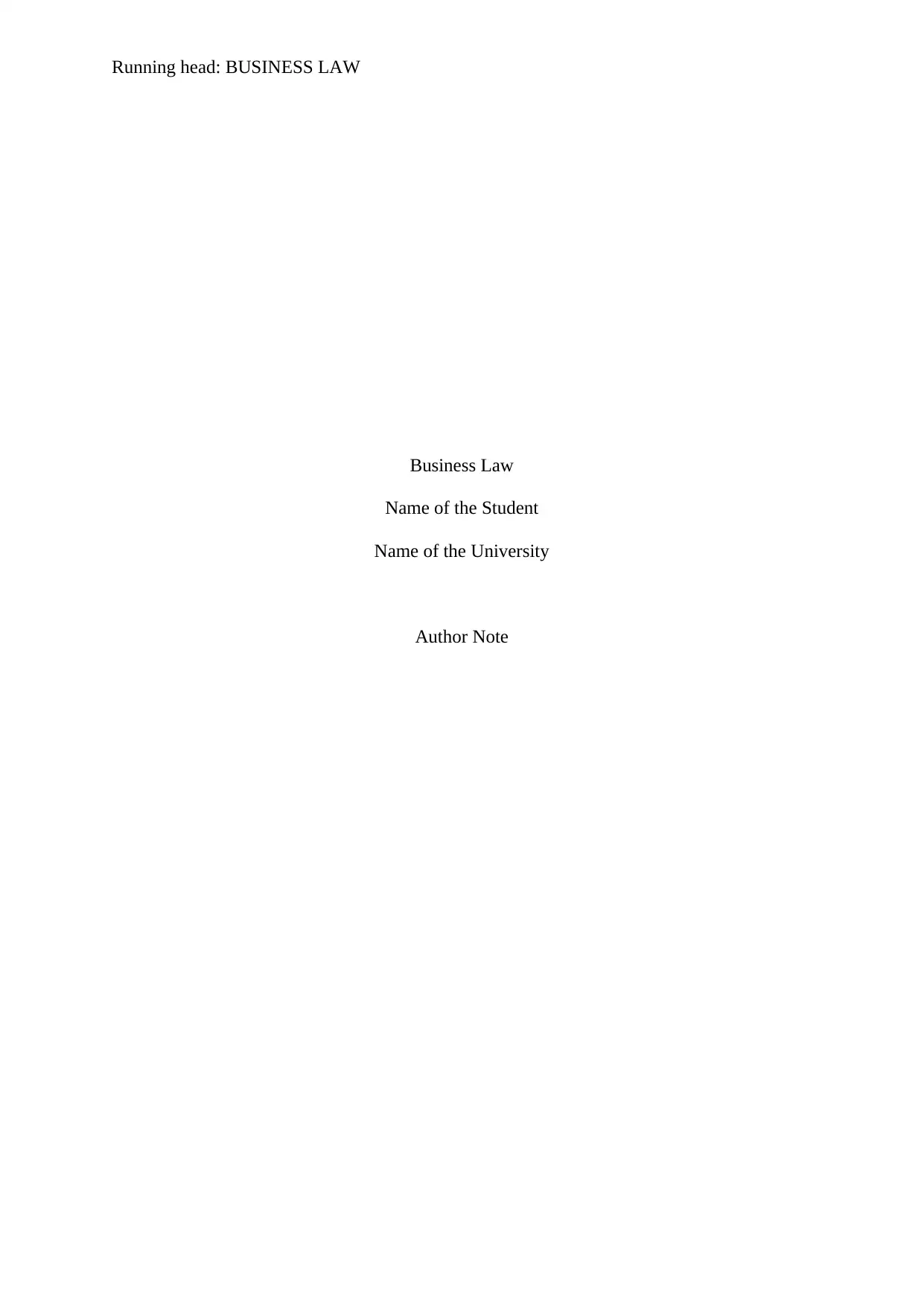
Running head: BUSINESS LAW
Business Law
Name of the Student
Name of the University
Author Note
Business Law
Name of the Student
Name of the University
Author Note
Paraphrase This Document
Need a fresh take? Get an instant paraphrase of this document with our AI Paraphraser

1
BUSINESS LAW
Table of Contents
Question 1......................................................................................................................2
Question 2.1...................................................................................................................4
Question 2.2...................................................................................................................6
Question 3......................................................................................................................8
References....................................................................................................................11
BUSINESS LAW
Table of Contents
Question 1......................................................................................................................2
Question 2.1...................................................................................................................4
Question 2.2...................................................................................................................6
Question 3......................................................................................................................8
References....................................................................................................................11
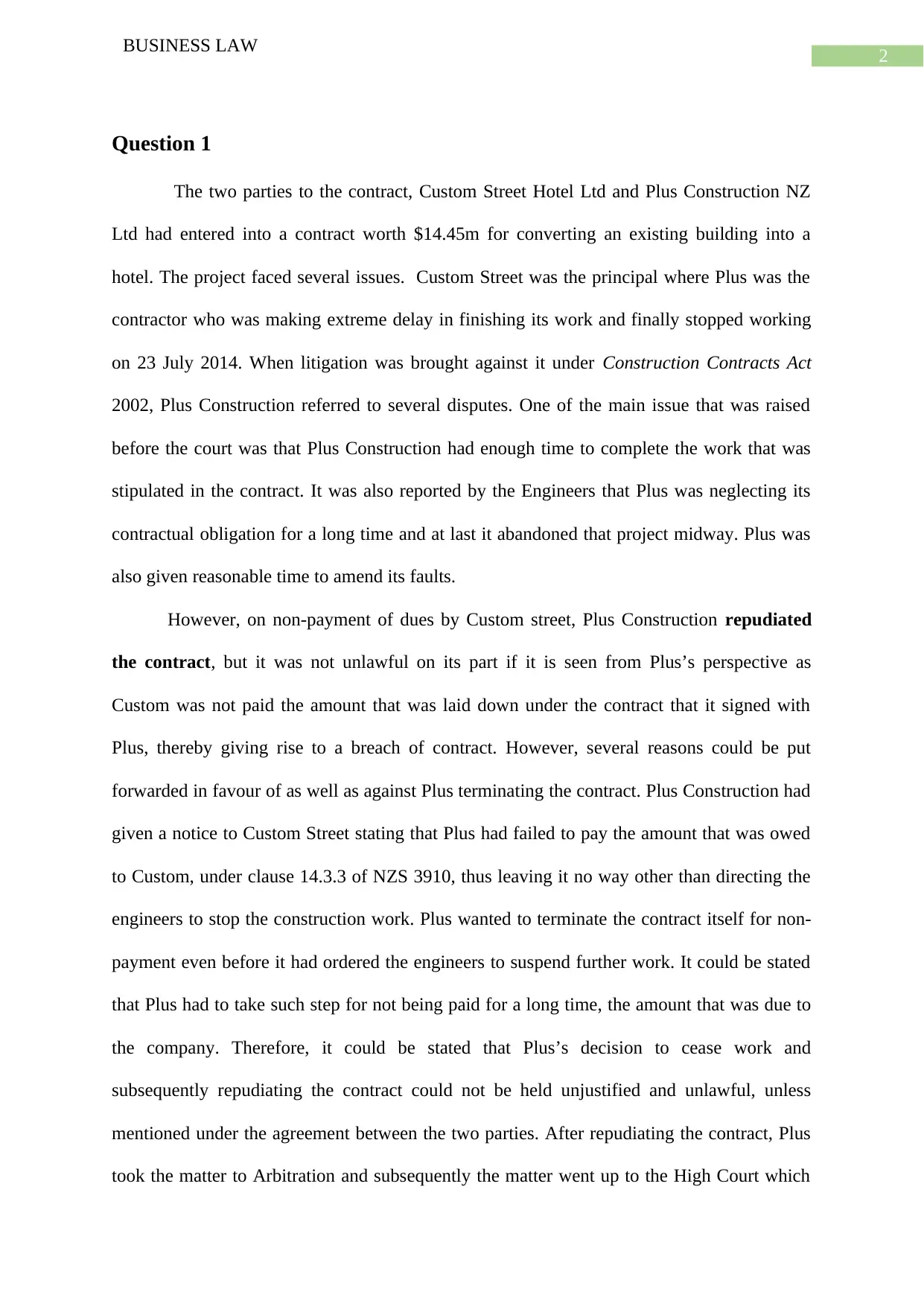
2
BUSINESS LAW
Question 1
The two parties to the contract, Custom Street Hotel Ltd and Plus Construction NZ
Ltd had entered into a contract worth $14.45m for converting an existing building into a
hotel. The project faced several issues. Custom Street was the principal where Plus was the
contractor who was making extreme delay in finishing its work and finally stopped working
on 23 July 2014. When litigation was brought against it under Construction Contracts Act
2002, Plus Construction referred to several disputes. One of the main issue that was raised
before the court was that Plus Construction had enough time to complete the work that was
stipulated in the contract. It was also reported by the Engineers that Plus was neglecting its
contractual obligation for a long time and at last it abandoned that project midway. Plus was
also given reasonable time to amend its faults.
However, on non-payment of dues by Custom street, Plus Construction repudiated
the contract, but it was not unlawful on its part if it is seen from Plus’s perspective as
Custom was not paid the amount that was laid down under the contract that it signed with
Plus, thereby giving rise to a breach of contract. However, several reasons could be put
forwarded in favour of as well as against Plus terminating the contract. Plus Construction had
given a notice to Custom Street stating that Plus had failed to pay the amount that was owed
to Custom, under clause 14.3.3 of NZS 3910, thus leaving it no way other than directing the
engineers to stop the construction work. Plus wanted to terminate the contract itself for non-
payment even before it had ordered the engineers to suspend further work. It could be stated
that Plus had to take such step for not being paid for a long time, the amount that was due to
the company. Therefore, it could be stated that Plus’s decision to cease work and
subsequently repudiating the contract could not be held unjustified and unlawful, unless
mentioned under the agreement between the two parties. After repudiating the contract, Plus
took the matter to Arbitration and subsequently the matter went up to the High Court which
BUSINESS LAW
Question 1
The two parties to the contract, Custom Street Hotel Ltd and Plus Construction NZ
Ltd had entered into a contract worth $14.45m for converting an existing building into a
hotel. The project faced several issues. Custom Street was the principal where Plus was the
contractor who was making extreme delay in finishing its work and finally stopped working
on 23 July 2014. When litigation was brought against it under Construction Contracts Act
2002, Plus Construction referred to several disputes. One of the main issue that was raised
before the court was that Plus Construction had enough time to complete the work that was
stipulated in the contract. It was also reported by the Engineers that Plus was neglecting its
contractual obligation for a long time and at last it abandoned that project midway. Plus was
also given reasonable time to amend its faults.
However, on non-payment of dues by Custom street, Plus Construction repudiated
the contract, but it was not unlawful on its part if it is seen from Plus’s perspective as
Custom was not paid the amount that was laid down under the contract that it signed with
Plus, thereby giving rise to a breach of contract. However, several reasons could be put
forwarded in favour of as well as against Plus terminating the contract. Plus Construction had
given a notice to Custom Street stating that Plus had failed to pay the amount that was owed
to Custom, under clause 14.3.3 of NZS 3910, thus leaving it no way other than directing the
engineers to stop the construction work. Plus wanted to terminate the contract itself for non-
payment even before it had ordered the engineers to suspend further work. It could be stated
that Plus had to take such step for not being paid for a long time, the amount that was due to
the company. Therefore, it could be stated that Plus’s decision to cease work and
subsequently repudiating the contract could not be held unjustified and unlawful, unless
mentioned under the agreement between the two parties. After repudiating the contract, Plus
took the matter to Arbitration and subsequently the matter went up to the High Court which
⊘ This is a preview!⊘
Do you want full access?
Subscribe today to unlock all pages.

Trusted by 1+ million students worldwide
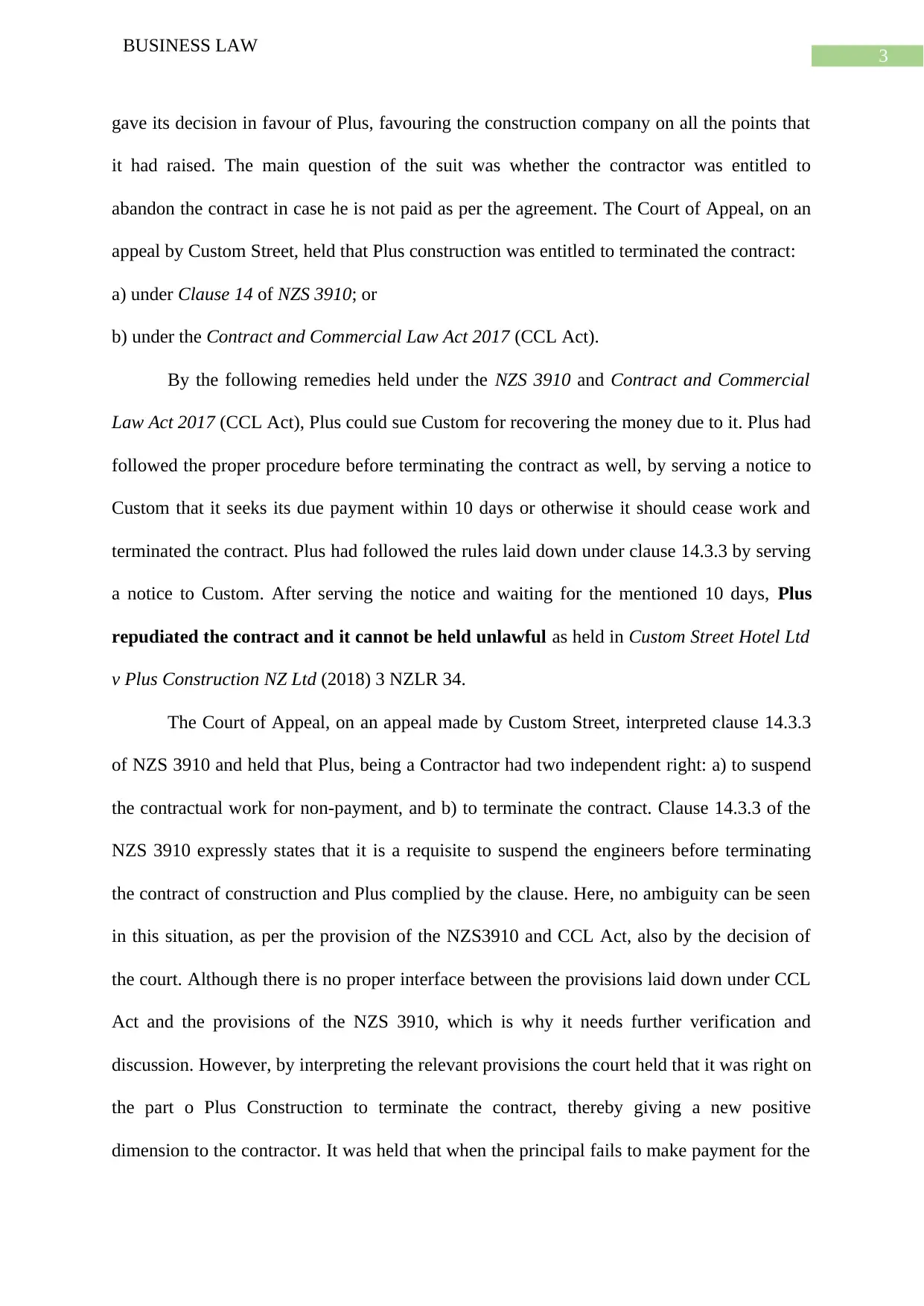
3
BUSINESS LAW
gave its decision in favour of Plus, favouring the construction company on all the points that
it had raised. The main question of the suit was whether the contractor was entitled to
abandon the contract in case he is not paid as per the agreement. The Court of Appeal, on an
appeal by Custom Street, held that Plus construction was entitled to terminated the contract:
a) under Clause 14 of NZS 3910; or
b) under the Contract and Commercial Law Act 2017 (CCL Act).
By the following remedies held under the NZS 3910 and Contract and Commercial
Law Act 2017 (CCL Act), Plus could sue Custom for recovering the money due to it. Plus had
followed the proper procedure before terminating the contract as well, by serving a notice to
Custom that it seeks its due payment within 10 days or otherwise it should cease work and
terminated the contract. Plus had followed the rules laid down under clause 14.3.3 by serving
a notice to Custom. After serving the notice and waiting for the mentioned 10 days, Plus
repudiated the contract and it cannot be held unlawful as held in Custom Street Hotel Ltd
v Plus Construction NZ Ltd (2018) 3 NZLR 34.
The Court of Appeal, on an appeal made by Custom Street, interpreted clause 14.3.3
of NZS 3910 and held that Plus, being a Contractor had two independent right: a) to suspend
the contractual work for non-payment, and b) to terminate the contract. Clause 14.3.3 of the
NZS 3910 expressly states that it is a requisite to suspend the engineers before terminating
the contract of construction and Plus complied by the clause. Here, no ambiguity can be seen
in this situation, as per the provision of the NZS3910 and CCL Act, also by the decision of
the court. Although there is no proper interface between the provisions laid down under CCL
Act and the provisions of the NZS 3910, which is why it needs further verification and
discussion. However, by interpreting the relevant provisions the court held that it was right on
the part o Plus Construction to terminate the contract, thereby giving a new positive
dimension to the contractor. It was held that when the principal fails to make payment for the
BUSINESS LAW
gave its decision in favour of Plus, favouring the construction company on all the points that
it had raised. The main question of the suit was whether the contractor was entitled to
abandon the contract in case he is not paid as per the agreement. The Court of Appeal, on an
appeal by Custom Street, held that Plus construction was entitled to terminated the contract:
a) under Clause 14 of NZS 3910; or
b) under the Contract and Commercial Law Act 2017 (CCL Act).
By the following remedies held under the NZS 3910 and Contract and Commercial
Law Act 2017 (CCL Act), Plus could sue Custom for recovering the money due to it. Plus had
followed the proper procedure before terminating the contract as well, by serving a notice to
Custom that it seeks its due payment within 10 days or otherwise it should cease work and
terminated the contract. Plus had followed the rules laid down under clause 14.3.3 by serving
a notice to Custom. After serving the notice and waiting for the mentioned 10 days, Plus
repudiated the contract and it cannot be held unlawful as held in Custom Street Hotel Ltd
v Plus Construction NZ Ltd (2018) 3 NZLR 34.
The Court of Appeal, on an appeal made by Custom Street, interpreted clause 14.3.3
of NZS 3910 and held that Plus, being a Contractor had two independent right: a) to suspend
the contractual work for non-payment, and b) to terminate the contract. Clause 14.3.3 of the
NZS 3910 expressly states that it is a requisite to suspend the engineers before terminating
the contract of construction and Plus complied by the clause. Here, no ambiguity can be seen
in this situation, as per the provision of the NZS3910 and CCL Act, also by the decision of
the court. Although there is no proper interface between the provisions laid down under CCL
Act and the provisions of the NZS 3910, which is why it needs further verification and
discussion. However, by interpreting the relevant provisions the court held that it was right on
the part o Plus Construction to terminate the contract, thereby giving a new positive
dimension to the contractor. It was held that when the principal fails to make payment for the
Paraphrase This Document
Need a fresh take? Get an instant paraphrase of this document with our AI Paraphraser
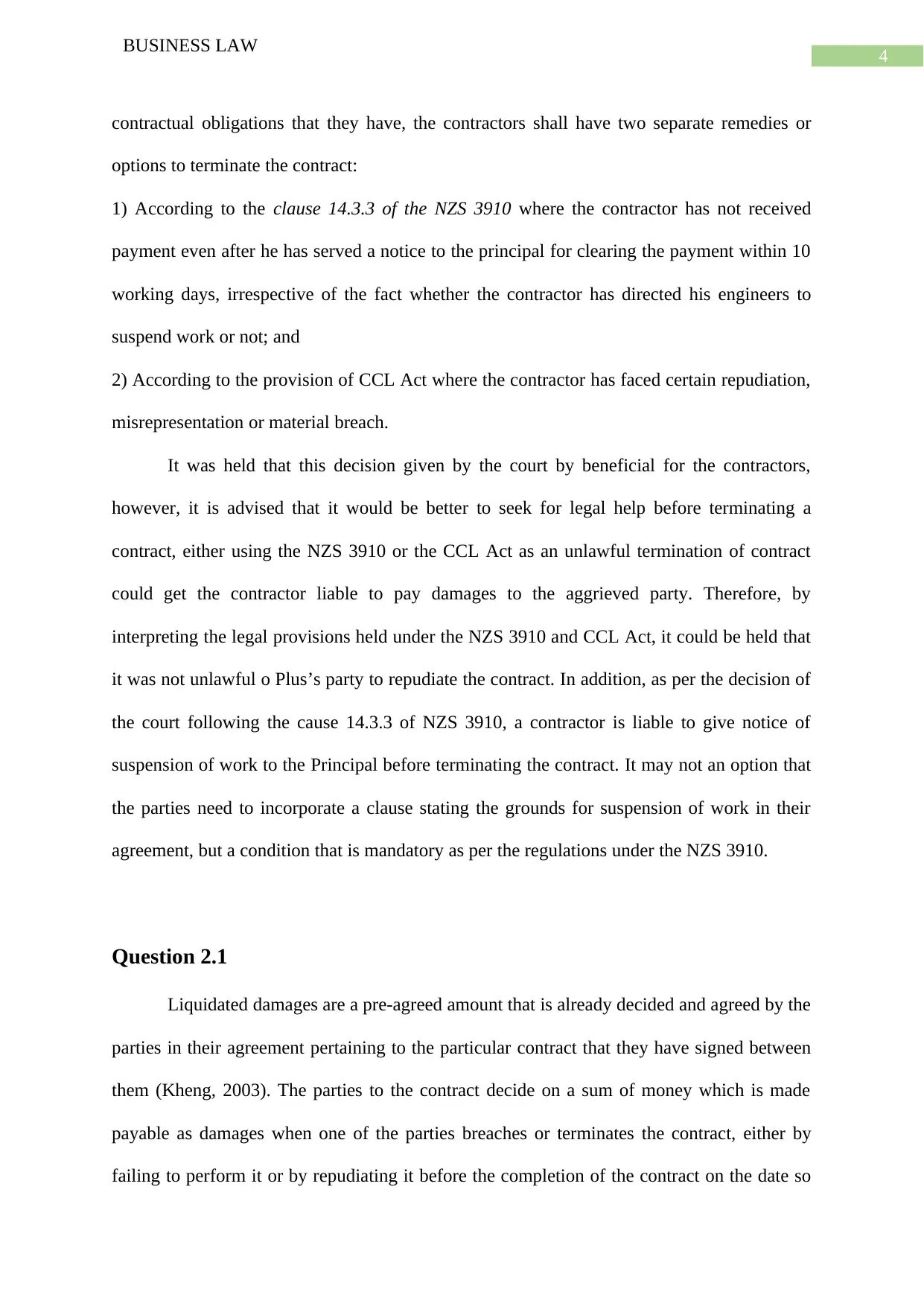
4
BUSINESS LAW
contractual obligations that they have, the contractors shall have two separate remedies or
options to terminate the contract:
1) According to the clause 14.3.3 of the NZS 3910 where the contractor has not received
payment even after he has served a notice to the principal for clearing the payment within 10
working days, irrespective of the fact whether the contractor has directed his engineers to
suspend work or not; and
2) According to the provision of CCL Act where the contractor has faced certain repudiation,
misrepresentation or material breach.
It was held that this decision given by the court by beneficial for the contractors,
however, it is advised that it would be better to seek for legal help before terminating a
contract, either using the NZS 3910 or the CCL Act as an unlawful termination of contract
could get the contractor liable to pay damages to the aggrieved party. Therefore, by
interpreting the legal provisions held under the NZS 3910 and CCL Act, it could be held that
it was not unlawful o Plus’s party to repudiate the contract. In addition, as per the decision of
the court following the cause 14.3.3 of NZS 3910, a contractor is liable to give notice of
suspension of work to the Principal before terminating the contract. It may not an option that
the parties need to incorporate a clause stating the grounds for suspension of work in their
agreement, but a condition that is mandatory as per the regulations under the NZS 3910.
Question 2.1
Liquidated damages are a pre-agreed amount that is already decided and agreed by the
parties in their agreement pertaining to the particular contract that they have signed between
them (Kheng, 2003). The parties to the contract decide on a sum of money which is made
payable as damages when one of the parties breaches or terminates the contract, either by
failing to perform it or by repudiating it before the completion of the contract on the date so
BUSINESS LAW
contractual obligations that they have, the contractors shall have two separate remedies or
options to terminate the contract:
1) According to the clause 14.3.3 of the NZS 3910 where the contractor has not received
payment even after he has served a notice to the principal for clearing the payment within 10
working days, irrespective of the fact whether the contractor has directed his engineers to
suspend work or not; and
2) According to the provision of CCL Act where the contractor has faced certain repudiation,
misrepresentation or material breach.
It was held that this decision given by the court by beneficial for the contractors,
however, it is advised that it would be better to seek for legal help before terminating a
contract, either using the NZS 3910 or the CCL Act as an unlawful termination of contract
could get the contractor liable to pay damages to the aggrieved party. Therefore, by
interpreting the legal provisions held under the NZS 3910 and CCL Act, it could be held that
it was not unlawful o Plus’s party to repudiate the contract. In addition, as per the decision of
the court following the cause 14.3.3 of NZS 3910, a contractor is liable to give notice of
suspension of work to the Principal before terminating the contract. It may not an option that
the parties need to incorporate a clause stating the grounds for suspension of work in their
agreement, but a condition that is mandatory as per the regulations under the NZS 3910.
Question 2.1
Liquidated damages are a pre-agreed amount that is already decided and agreed by the
parties in their agreement pertaining to the particular contract that they have signed between
them (Kheng, 2003). The parties to the contract decide on a sum of money which is made
payable as damages when one of the parties breaches or terminates the contract, either by
failing to perform it or by repudiating it before the completion of the contract on the date so
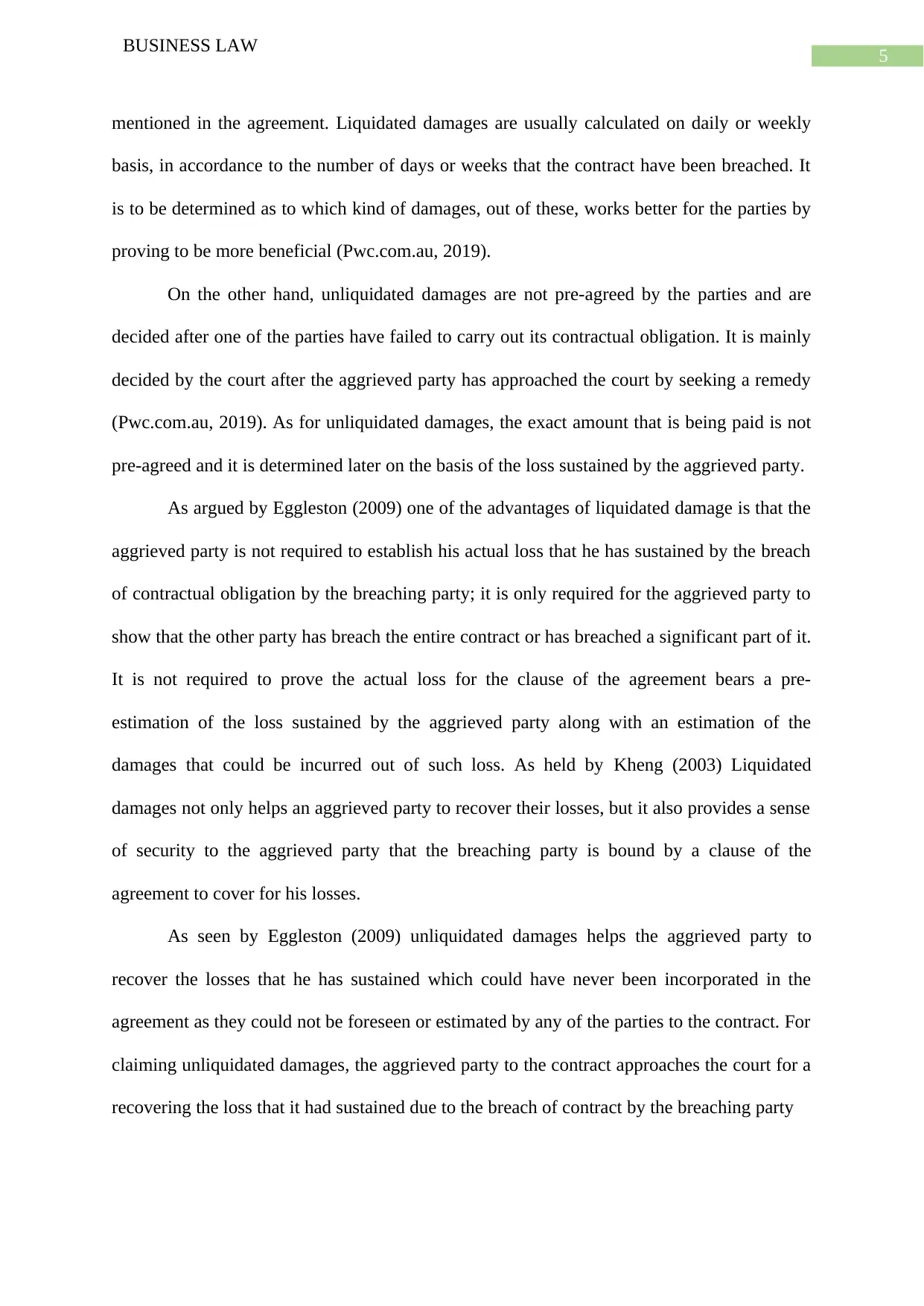
5
BUSINESS LAW
mentioned in the agreement. Liquidated damages are usually calculated on daily or weekly
basis, in accordance to the number of days or weeks that the contract have been breached. It
is to be determined as to which kind of damages, out of these, works better for the parties by
proving to be more beneficial (Pwc.com.au, 2019).
On the other hand, unliquidated damages are not pre-agreed by the parties and are
decided after one of the parties have failed to carry out its contractual obligation. It is mainly
decided by the court after the aggrieved party has approached the court by seeking a remedy
(Pwc.com.au, 2019). As for unliquidated damages, the exact amount that is being paid is not
pre-agreed and it is determined later on the basis of the loss sustained by the aggrieved party.
As argued by Eggleston (2009) one of the advantages of liquidated damage is that the
aggrieved party is not required to establish his actual loss that he has sustained by the breach
of contractual obligation by the breaching party; it is only required for the aggrieved party to
show that the other party has breach the entire contract or has breached a significant part of it.
It is not required to prove the actual loss for the clause of the agreement bears a pre-
estimation of the loss sustained by the aggrieved party along with an estimation of the
damages that could be incurred out of such loss. As held by Kheng (2003) Liquidated
damages not only helps an aggrieved party to recover their losses, but it also provides a sense
of security to the aggrieved party that the breaching party is bound by a clause of the
agreement to cover for his losses.
As seen by Eggleston (2009) unliquidated damages helps the aggrieved party to
recover the losses that he has sustained which could have never been incorporated in the
agreement as they could not be foreseen or estimated by any of the parties to the contract. For
claiming unliquidated damages, the aggrieved party to the contract approaches the court for a
recovering the loss that it had sustained due to the breach of contract by the breaching party
BUSINESS LAW
mentioned in the agreement. Liquidated damages are usually calculated on daily or weekly
basis, in accordance to the number of days or weeks that the contract have been breached. It
is to be determined as to which kind of damages, out of these, works better for the parties by
proving to be more beneficial (Pwc.com.au, 2019).
On the other hand, unliquidated damages are not pre-agreed by the parties and are
decided after one of the parties have failed to carry out its contractual obligation. It is mainly
decided by the court after the aggrieved party has approached the court by seeking a remedy
(Pwc.com.au, 2019). As for unliquidated damages, the exact amount that is being paid is not
pre-agreed and it is determined later on the basis of the loss sustained by the aggrieved party.
As argued by Eggleston (2009) one of the advantages of liquidated damage is that the
aggrieved party is not required to establish his actual loss that he has sustained by the breach
of contractual obligation by the breaching party; it is only required for the aggrieved party to
show that the other party has breach the entire contract or has breached a significant part of it.
It is not required to prove the actual loss for the clause of the agreement bears a pre-
estimation of the loss sustained by the aggrieved party along with an estimation of the
damages that could be incurred out of such loss. As held by Kheng (2003) Liquidated
damages not only helps an aggrieved party to recover their losses, but it also provides a sense
of security to the aggrieved party that the breaching party is bound by a clause of the
agreement to cover for his losses.
As seen by Eggleston (2009) unliquidated damages helps the aggrieved party to
recover the losses that he has sustained which could have never been incorporated in the
agreement as they could not be foreseen or estimated by any of the parties to the contract. For
claiming unliquidated damages, the aggrieved party to the contract approaches the court for a
recovering the loss that it had sustained due to the breach of contract by the breaching party
⊘ This is a preview!⊘
Do you want full access?
Subscribe today to unlock all pages.

Trusted by 1+ million students worldwide
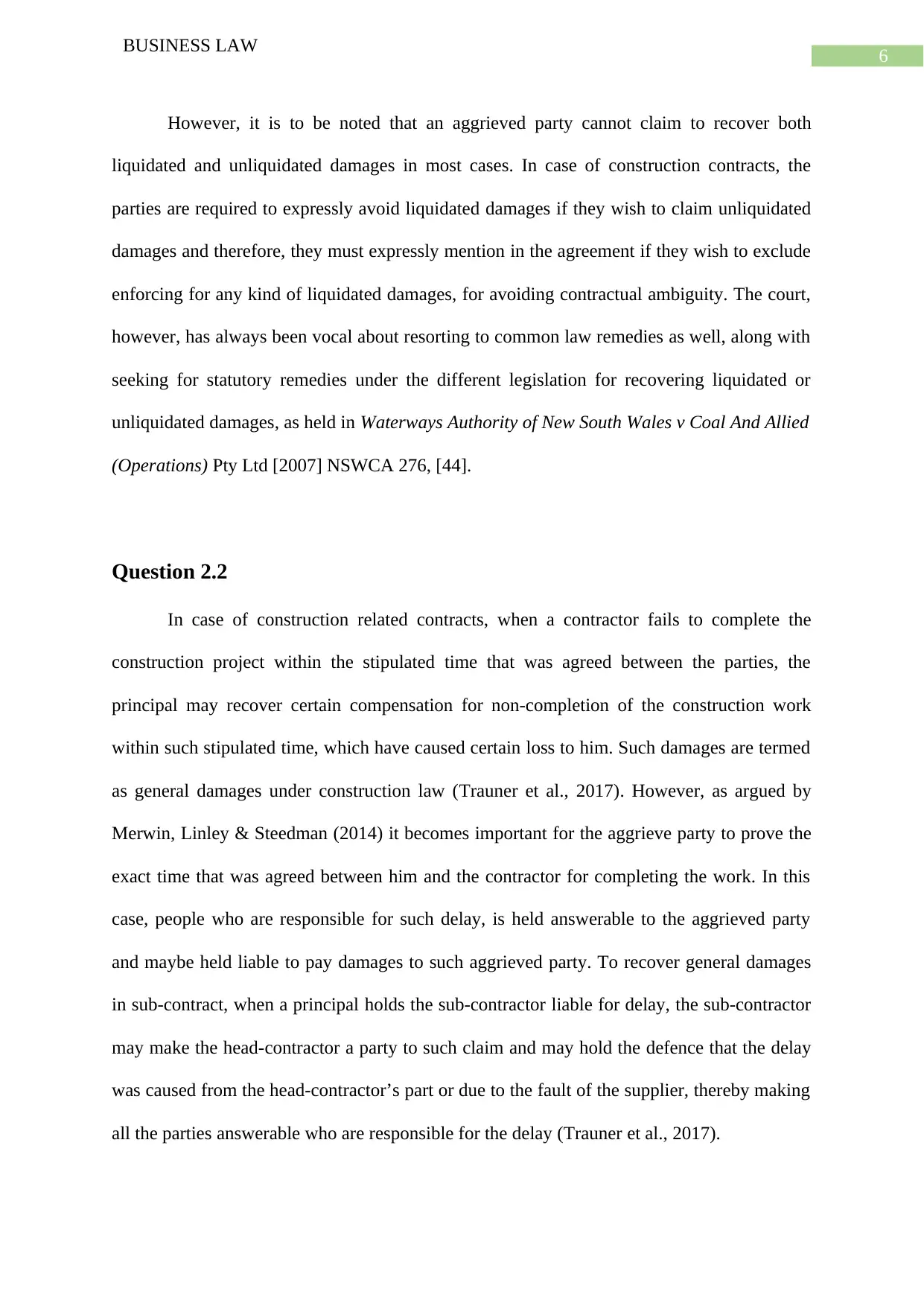
6
BUSINESS LAW
However, it is to be noted that an aggrieved party cannot claim to recover both
liquidated and unliquidated damages in most cases. In case of construction contracts, the
parties are required to expressly avoid liquidated damages if they wish to claim unliquidated
damages and therefore, they must expressly mention in the agreement if they wish to exclude
enforcing for any kind of liquidated damages, for avoiding contractual ambiguity. The court,
however, has always been vocal about resorting to common law remedies as well, along with
seeking for statutory remedies under the different legislation for recovering liquidated or
unliquidated damages, as held in Waterways Authority of New South Wales v Coal And Allied
(Operations) Pty Ltd [2007] NSWCA 276, [44].
Question 2.2
In case of construction related contracts, when a contractor fails to complete the
construction project within the stipulated time that was agreed between the parties, the
principal may recover certain compensation for non-completion of the construction work
within such stipulated time, which have caused certain loss to him. Such damages are termed
as general damages under construction law (Trauner et al., 2017). However, as argued by
Merwin, Linley & Steedman (2014) it becomes important for the aggrieve party to prove the
exact time that was agreed between him and the contractor for completing the work. In this
case, people who are responsible for such delay, is held answerable to the aggrieved party
and maybe held liable to pay damages to such aggrieved party. To recover general damages
in sub-contract, when a principal holds the sub-contractor liable for delay, the sub-contractor
may make the head-contractor a party to such claim and may hold the defence that the delay
was caused from the head-contractor’s part or due to the fault of the supplier, thereby making
all the parties answerable who are responsible for the delay (Trauner et al., 2017).
BUSINESS LAW
However, it is to be noted that an aggrieved party cannot claim to recover both
liquidated and unliquidated damages in most cases. In case of construction contracts, the
parties are required to expressly avoid liquidated damages if they wish to claim unliquidated
damages and therefore, they must expressly mention in the agreement if they wish to exclude
enforcing for any kind of liquidated damages, for avoiding contractual ambiguity. The court,
however, has always been vocal about resorting to common law remedies as well, along with
seeking for statutory remedies under the different legislation for recovering liquidated or
unliquidated damages, as held in Waterways Authority of New South Wales v Coal And Allied
(Operations) Pty Ltd [2007] NSWCA 276, [44].
Question 2.2
In case of construction related contracts, when a contractor fails to complete the
construction project within the stipulated time that was agreed between the parties, the
principal may recover certain compensation for non-completion of the construction work
within such stipulated time, which have caused certain loss to him. Such damages are termed
as general damages under construction law (Trauner et al., 2017). However, as argued by
Merwin, Linley & Steedman (2014) it becomes important for the aggrieve party to prove the
exact time that was agreed between him and the contractor for completing the work. In this
case, people who are responsible for such delay, is held answerable to the aggrieved party
and maybe held liable to pay damages to such aggrieved party. To recover general damages
in sub-contract, when a principal holds the sub-contractor liable for delay, the sub-contractor
may make the head-contractor a party to such claim and may hold the defence that the delay
was caused from the head-contractor’s part or due to the fault of the supplier, thereby making
all the parties answerable who are responsible for the delay (Trauner et al., 2017).
Paraphrase This Document
Need a fresh take? Get an instant paraphrase of this document with our AI Paraphraser
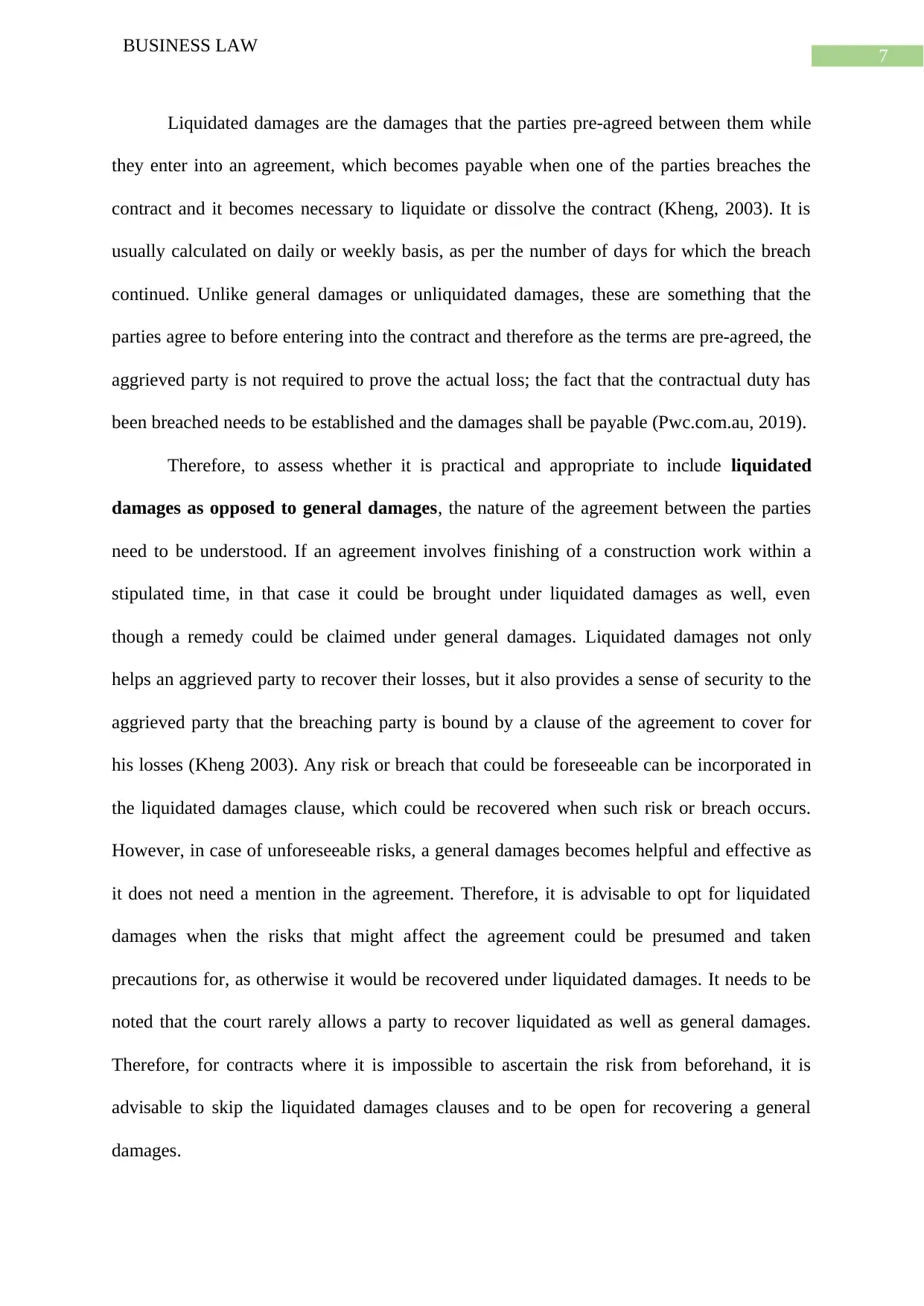
7
BUSINESS LAW
Liquidated damages are the damages that the parties pre-agreed between them while
they enter into an agreement, which becomes payable when one of the parties breaches the
contract and it becomes necessary to liquidate or dissolve the contract (Kheng, 2003). It is
usually calculated on daily or weekly basis, as per the number of days for which the breach
continued. Unlike general damages or unliquidated damages, these are something that the
parties agree to before entering into the contract and therefore as the terms are pre-agreed, the
aggrieved party is not required to prove the actual loss; the fact that the contractual duty has
been breached needs to be established and the damages shall be payable (Pwc.com.au, 2019).
Therefore, to assess whether it is practical and appropriate to include liquidated
damages as opposed to general damages, the nature of the agreement between the parties
need to be understood. If an agreement involves finishing of a construction work within a
stipulated time, in that case it could be brought under liquidated damages as well, even
though a remedy could be claimed under general damages. Liquidated damages not only
helps an aggrieved party to recover their losses, but it also provides a sense of security to the
aggrieved party that the breaching party is bound by a clause of the agreement to cover for
his losses (Kheng 2003). Any risk or breach that could be foreseeable can be incorporated in
the liquidated damages clause, which could be recovered when such risk or breach occurs.
However, in case of unforeseeable risks, a general damages becomes helpful and effective as
it does not need a mention in the agreement. Therefore, it is advisable to opt for liquidated
damages when the risks that might affect the agreement could be presumed and taken
precautions for, as otherwise it would be recovered under liquidated damages. It needs to be
noted that the court rarely allows a party to recover liquidated as well as general damages.
Therefore, for contracts where it is impossible to ascertain the risk from beforehand, it is
advisable to skip the liquidated damages clauses and to be open for recovering a general
damages.
BUSINESS LAW
Liquidated damages are the damages that the parties pre-agreed between them while
they enter into an agreement, which becomes payable when one of the parties breaches the
contract and it becomes necessary to liquidate or dissolve the contract (Kheng, 2003). It is
usually calculated on daily or weekly basis, as per the number of days for which the breach
continued. Unlike general damages or unliquidated damages, these are something that the
parties agree to before entering into the contract and therefore as the terms are pre-agreed, the
aggrieved party is not required to prove the actual loss; the fact that the contractual duty has
been breached needs to be established and the damages shall be payable (Pwc.com.au, 2019).
Therefore, to assess whether it is practical and appropriate to include liquidated
damages as opposed to general damages, the nature of the agreement between the parties
need to be understood. If an agreement involves finishing of a construction work within a
stipulated time, in that case it could be brought under liquidated damages as well, even
though a remedy could be claimed under general damages. Liquidated damages not only
helps an aggrieved party to recover their losses, but it also provides a sense of security to the
aggrieved party that the breaching party is bound by a clause of the agreement to cover for
his losses (Kheng 2003). Any risk or breach that could be foreseeable can be incorporated in
the liquidated damages clause, which could be recovered when such risk or breach occurs.
However, in case of unforeseeable risks, a general damages becomes helpful and effective as
it does not need a mention in the agreement. Therefore, it is advisable to opt for liquidated
damages when the risks that might affect the agreement could be presumed and taken
precautions for, as otherwise it would be recovered under liquidated damages. It needs to be
noted that the court rarely allows a party to recover liquidated as well as general damages.
Therefore, for contracts where it is impossible to ascertain the risk from beforehand, it is
advisable to skip the liquidated damages clauses and to be open for recovering a general
damages.
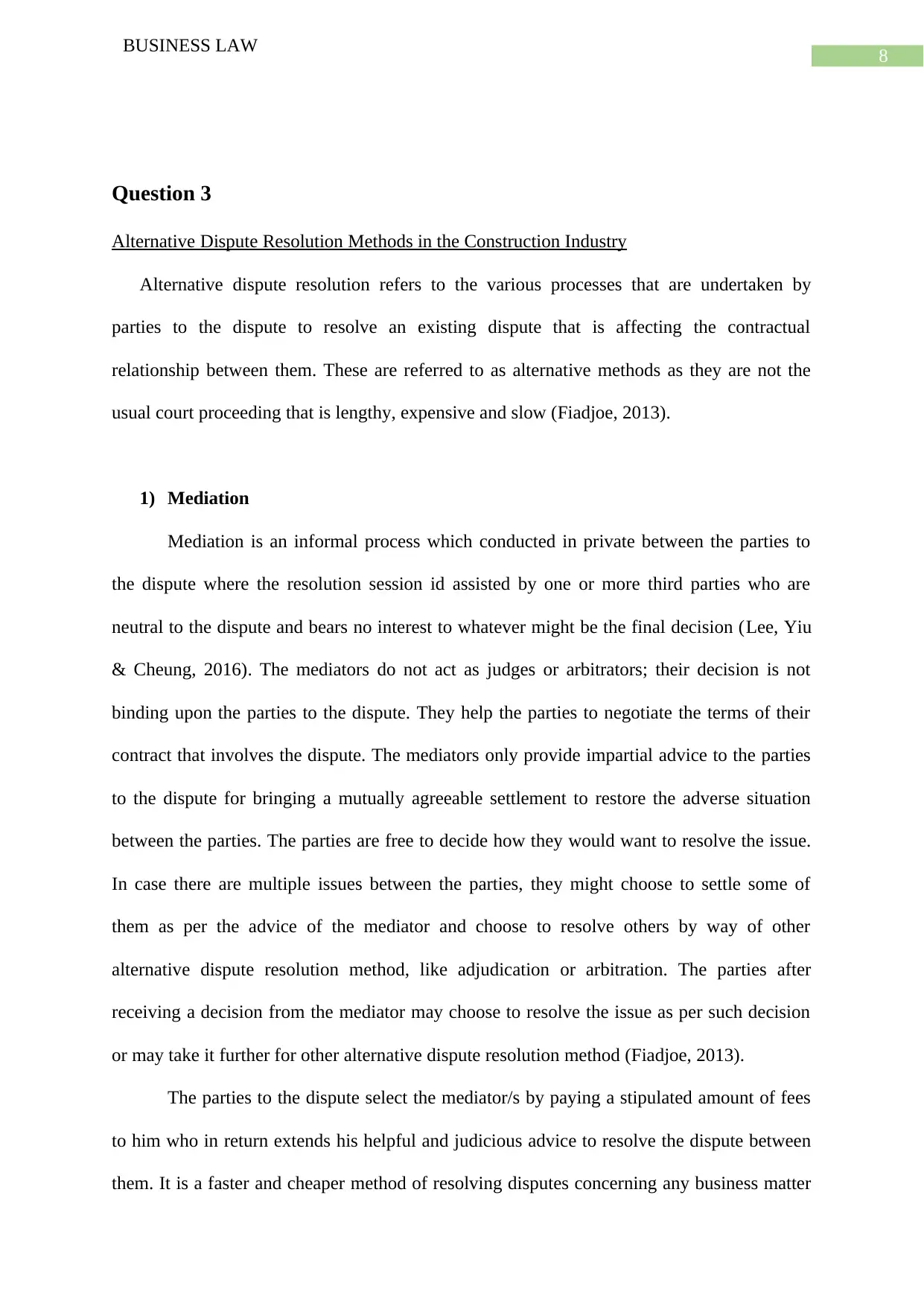
8
BUSINESS LAW
Question 3
Alternative Dispute Resolution Methods in the Construction Industry
Alternative dispute resolution refers to the various processes that are undertaken by
parties to the dispute to resolve an existing dispute that is affecting the contractual
relationship between them. These are referred to as alternative methods as they are not the
usual court proceeding that is lengthy, expensive and slow (Fiadjoe, 2013).
1) Mediation
Mediation is an informal process which conducted in private between the parties to
the dispute where the resolution session id assisted by one or more third parties who are
neutral to the dispute and bears no interest to whatever might be the final decision (Lee, Yiu
& Cheung, 2016). The mediators do not act as judges or arbitrators; their decision is not
binding upon the parties to the dispute. They help the parties to negotiate the terms of their
contract that involves the dispute. The mediators only provide impartial advice to the parties
to the dispute for bringing a mutually agreeable settlement to restore the adverse situation
between the parties. The parties are free to decide how they would want to resolve the issue.
In case there are multiple issues between the parties, they might choose to settle some of
them as per the advice of the mediator and choose to resolve others by way of other
alternative dispute resolution method, like adjudication or arbitration. The parties after
receiving a decision from the mediator may choose to resolve the issue as per such decision
or may take it further for other alternative dispute resolution method (Fiadjoe, 2013).
The parties to the dispute select the mediator/s by paying a stipulated amount of fees
to him who in return extends his helpful and judicious advice to resolve the dispute between
them. It is a faster and cheaper method of resolving disputes concerning any business matter
BUSINESS LAW
Question 3
Alternative Dispute Resolution Methods in the Construction Industry
Alternative dispute resolution refers to the various processes that are undertaken by
parties to the dispute to resolve an existing dispute that is affecting the contractual
relationship between them. These are referred to as alternative methods as they are not the
usual court proceeding that is lengthy, expensive and slow (Fiadjoe, 2013).
1) Mediation
Mediation is an informal process which conducted in private between the parties to
the dispute where the resolution session id assisted by one or more third parties who are
neutral to the dispute and bears no interest to whatever might be the final decision (Lee, Yiu
& Cheung, 2016). The mediators do not act as judges or arbitrators; their decision is not
binding upon the parties to the dispute. They help the parties to negotiate the terms of their
contract that involves the dispute. The mediators only provide impartial advice to the parties
to the dispute for bringing a mutually agreeable settlement to restore the adverse situation
between the parties. The parties are free to decide how they would want to resolve the issue.
In case there are multiple issues between the parties, they might choose to settle some of
them as per the advice of the mediator and choose to resolve others by way of other
alternative dispute resolution method, like adjudication or arbitration. The parties after
receiving a decision from the mediator may choose to resolve the issue as per such decision
or may take it further for other alternative dispute resolution method (Fiadjoe, 2013).
The parties to the dispute select the mediator/s by paying a stipulated amount of fees
to him who in return extends his helpful and judicious advice to resolve the dispute between
them. It is a faster and cheaper method of resolving disputes concerning any business matter
⊘ This is a preview!⊘
Do you want full access?
Subscribe today to unlock all pages.

Trusted by 1+ million students worldwide
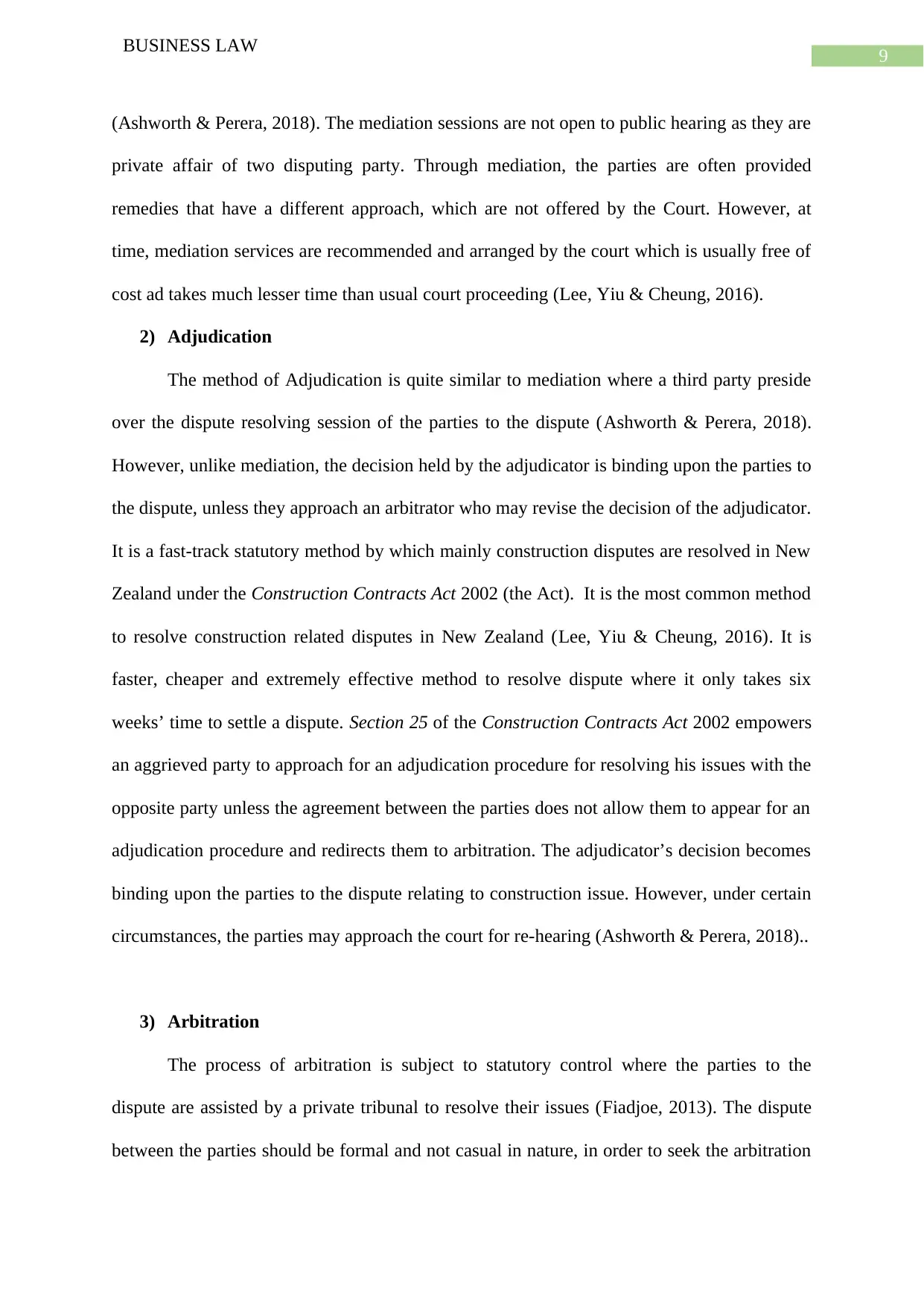
9
BUSINESS LAW
(Ashworth & Perera, 2018). The mediation sessions are not open to public hearing as they are
private affair of two disputing party. Through mediation, the parties are often provided
remedies that have a different approach, which are not offered by the Court. However, at
time, mediation services are recommended and arranged by the court which is usually free of
cost ad takes much lesser time than usual court proceeding (Lee, Yiu & Cheung, 2016).
2) Adjudication
The method of Adjudication is quite similar to mediation where a third party preside
over the dispute resolving session of the parties to the dispute (Ashworth & Perera, 2018).
However, unlike mediation, the decision held by the adjudicator is binding upon the parties to
the dispute, unless they approach an arbitrator who may revise the decision of the adjudicator.
It is a fast-track statutory method by which mainly construction disputes are resolved in New
Zealand under the Construction Contracts Act 2002 (the Act). It is the most common method
to resolve construction related disputes in New Zealand (Lee, Yiu & Cheung, 2016). It is
faster, cheaper and extremely effective method to resolve dispute where it only takes six
weeks’ time to settle a dispute. Section 25 of the Construction Contracts Act 2002 empowers
an aggrieved party to approach for an adjudication procedure for resolving his issues with the
opposite party unless the agreement between the parties does not allow them to appear for an
adjudication procedure and redirects them to arbitration. The adjudicator’s decision becomes
binding upon the parties to the dispute relating to construction issue. However, under certain
circumstances, the parties may approach the court for re-hearing (Ashworth & Perera, 2018)..
3) Arbitration
The process of arbitration is subject to statutory control where the parties to the
dispute are assisted by a private tribunal to resolve their issues (Fiadjoe, 2013). The dispute
between the parties should be formal and not casual in nature, in order to seek the arbitration
BUSINESS LAW
(Ashworth & Perera, 2018). The mediation sessions are not open to public hearing as they are
private affair of two disputing party. Through mediation, the parties are often provided
remedies that have a different approach, which are not offered by the Court. However, at
time, mediation services are recommended and arranged by the court which is usually free of
cost ad takes much lesser time than usual court proceeding (Lee, Yiu & Cheung, 2016).
2) Adjudication
The method of Adjudication is quite similar to mediation where a third party preside
over the dispute resolving session of the parties to the dispute (Ashworth & Perera, 2018).
However, unlike mediation, the decision held by the adjudicator is binding upon the parties to
the dispute, unless they approach an arbitrator who may revise the decision of the adjudicator.
It is a fast-track statutory method by which mainly construction disputes are resolved in New
Zealand under the Construction Contracts Act 2002 (the Act). It is the most common method
to resolve construction related disputes in New Zealand (Lee, Yiu & Cheung, 2016). It is
faster, cheaper and extremely effective method to resolve dispute where it only takes six
weeks’ time to settle a dispute. Section 25 of the Construction Contracts Act 2002 empowers
an aggrieved party to approach for an adjudication procedure for resolving his issues with the
opposite party unless the agreement between the parties does not allow them to appear for an
adjudication procedure and redirects them to arbitration. The adjudicator’s decision becomes
binding upon the parties to the dispute relating to construction issue. However, under certain
circumstances, the parties may approach the court for re-hearing (Ashworth & Perera, 2018)..
3) Arbitration
The process of arbitration is subject to statutory control where the parties to the
dispute are assisted by a private tribunal to resolve their issues (Fiadjoe, 2013). The dispute
between the parties should be formal and not casual in nature, in order to seek the arbitration
Paraphrase This Document
Need a fresh take? Get an instant paraphrase of this document with our AI Paraphraser
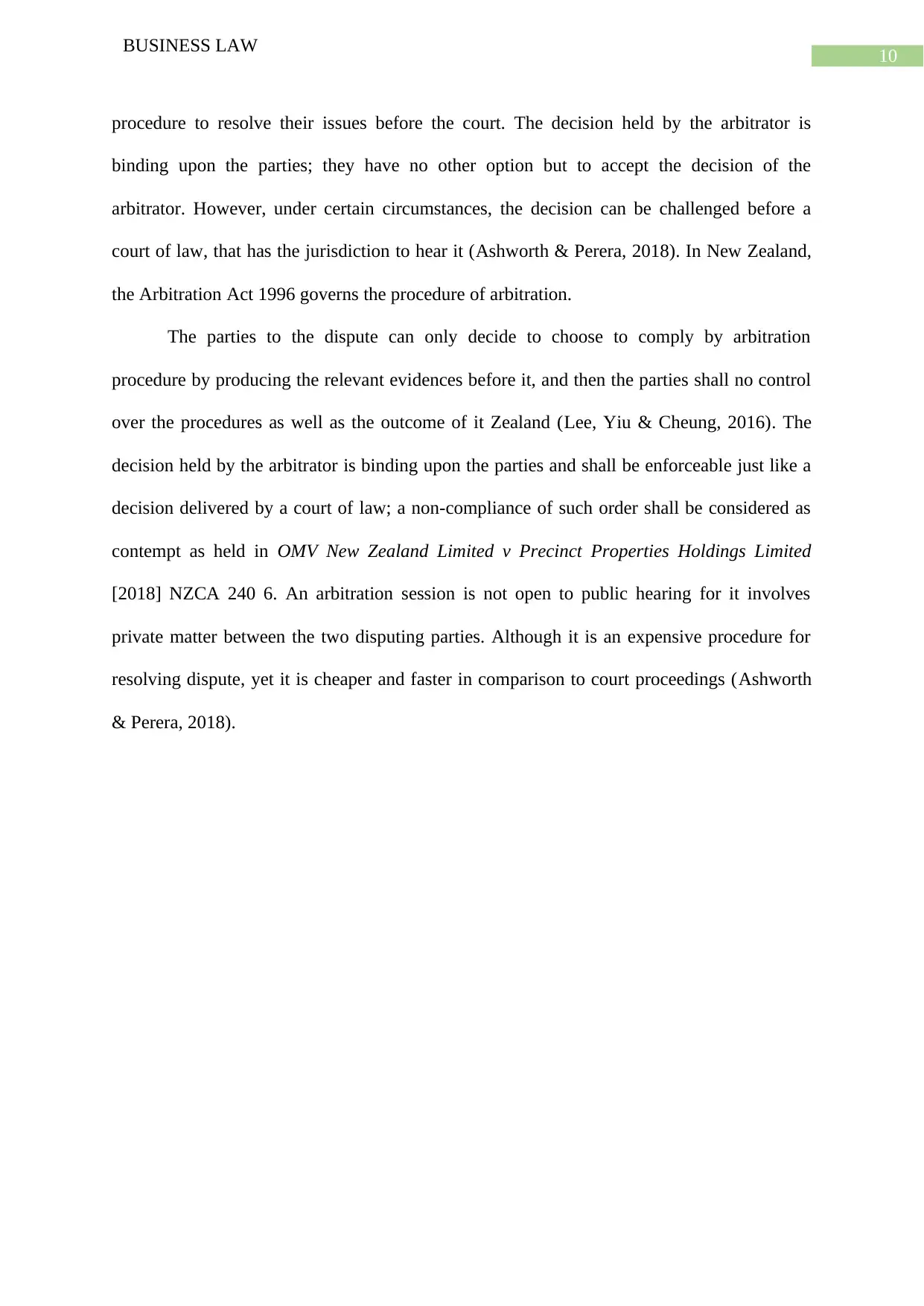
10
BUSINESS LAW
procedure to resolve their issues before the court. The decision held by the arbitrator is
binding upon the parties; they have no other option but to accept the decision of the
arbitrator. However, under certain circumstances, the decision can be challenged before a
court of law, that has the jurisdiction to hear it (Ashworth & Perera, 2018). In New Zealand,
the Arbitration Act 1996 governs the procedure of arbitration.
The parties to the dispute can only decide to choose to comply by arbitration
procedure by producing the relevant evidences before it, and then the parties shall no control
over the procedures as well as the outcome of it Zealand (Lee, Yiu & Cheung, 2016). The
decision held by the arbitrator is binding upon the parties and shall be enforceable just like a
decision delivered by a court of law; a non-compliance of such order shall be considered as
contempt as held in OMV New Zealand Limited v Precinct Properties Holdings Limited
[2018] NZCA 240 6. An arbitration session is not open to public hearing for it involves
private matter between the two disputing parties. Although it is an expensive procedure for
resolving dispute, yet it is cheaper and faster in comparison to court proceedings (Ashworth
& Perera, 2018).
BUSINESS LAW
procedure to resolve their issues before the court. The decision held by the arbitrator is
binding upon the parties; they have no other option but to accept the decision of the
arbitrator. However, under certain circumstances, the decision can be challenged before a
court of law, that has the jurisdiction to hear it (Ashworth & Perera, 2018). In New Zealand,
the Arbitration Act 1996 governs the procedure of arbitration.
The parties to the dispute can only decide to choose to comply by arbitration
procedure by producing the relevant evidences before it, and then the parties shall no control
over the procedures as well as the outcome of it Zealand (Lee, Yiu & Cheung, 2016). The
decision held by the arbitrator is binding upon the parties and shall be enforceable just like a
decision delivered by a court of law; a non-compliance of such order shall be considered as
contempt as held in OMV New Zealand Limited v Precinct Properties Holdings Limited
[2018] NZCA 240 6. An arbitration session is not open to public hearing for it involves
private matter between the two disputing parties. Although it is an expensive procedure for
resolving dispute, yet it is cheaper and faster in comparison to court proceedings (Ashworth
& Perera, 2018).
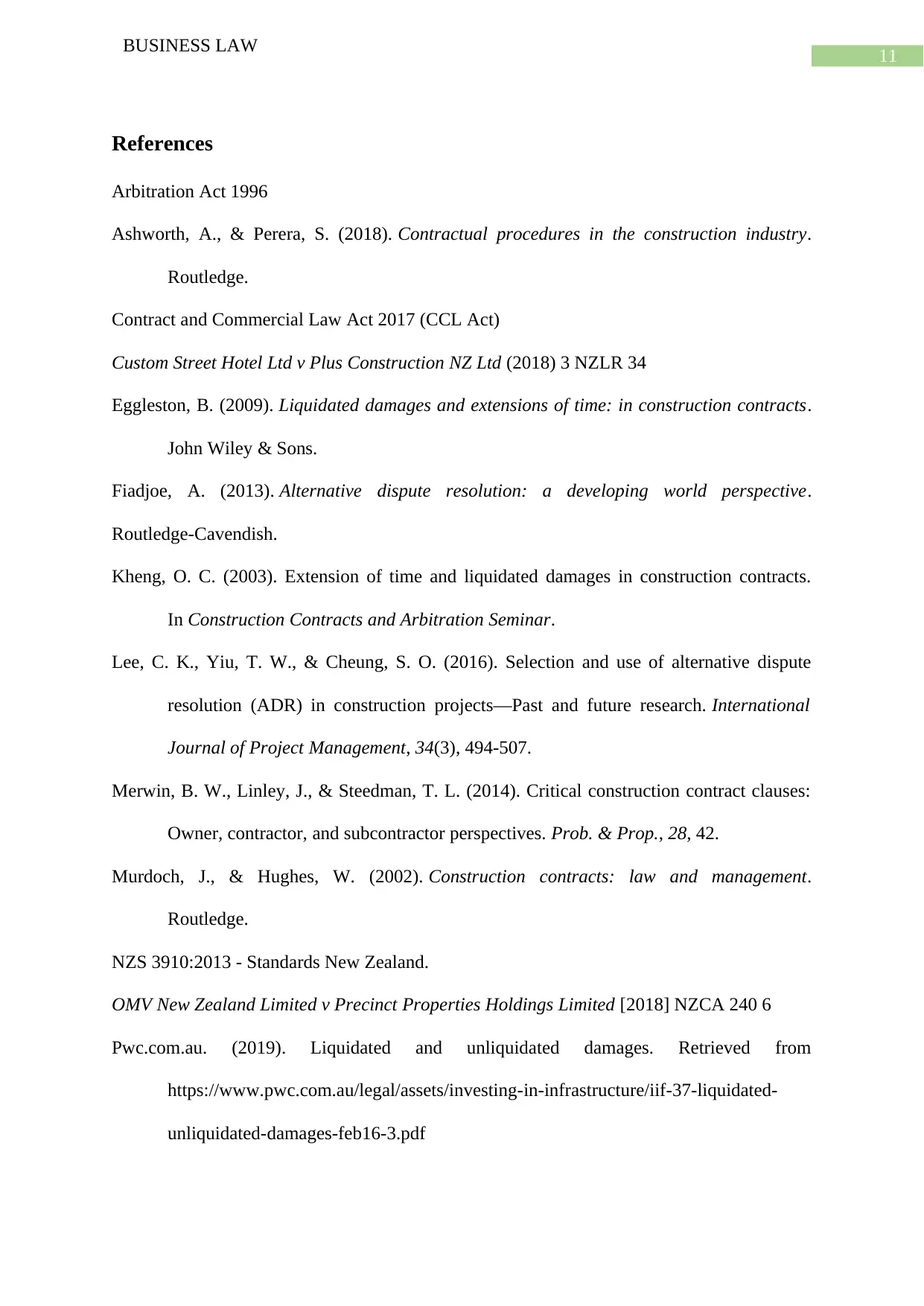
11
BUSINESS LAW
References
Arbitration Act 1996
Ashworth, A., & Perera, S. (2018). Contractual procedures in the construction industry.
Routledge.
Contract and Commercial Law Act 2017 (CCL Act)
Custom Street Hotel Ltd v Plus Construction NZ Ltd (2018) 3 NZLR 34
Eggleston, B. (2009). Liquidated damages and extensions of time: in construction contracts.
John Wiley & Sons.
Fiadjoe, A. (2013). Alternative dispute resolution: a developing world perspective.
Routledge-Cavendish.
Kheng, O. C. (2003). Extension of time and liquidated damages in construction contracts.
In Construction Contracts and Arbitration Seminar.
Lee, C. K., Yiu, T. W., & Cheung, S. O. (2016). Selection and use of alternative dispute
resolution (ADR) in construction projects—Past and future research. International
Journal of Project Management, 34(3), 494-507.
Merwin, B. W., Linley, J., & Steedman, T. L. (2014). Critical construction contract clauses:
Owner, contractor, and subcontractor perspectives. Prob. & Prop., 28, 42.
Murdoch, J., & Hughes, W. (2002). Construction contracts: law and management.
Routledge.
NZS 3910:2013 - Standards New Zealand.
OMV New Zealand Limited v Precinct Properties Holdings Limited [2018] NZCA 240 6
Pwc.com.au. (2019). Liquidated and unliquidated damages. Retrieved from
https://www.pwc.com.au/legal/assets/investing-in-infrastructure/iif-37-liquidated-
unliquidated-damages-feb16-3.pdf
BUSINESS LAW
References
Arbitration Act 1996
Ashworth, A., & Perera, S. (2018). Contractual procedures in the construction industry.
Routledge.
Contract and Commercial Law Act 2017 (CCL Act)
Custom Street Hotel Ltd v Plus Construction NZ Ltd (2018) 3 NZLR 34
Eggleston, B. (2009). Liquidated damages and extensions of time: in construction contracts.
John Wiley & Sons.
Fiadjoe, A. (2013). Alternative dispute resolution: a developing world perspective.
Routledge-Cavendish.
Kheng, O. C. (2003). Extension of time and liquidated damages in construction contracts.
In Construction Contracts and Arbitration Seminar.
Lee, C. K., Yiu, T. W., & Cheung, S. O. (2016). Selection and use of alternative dispute
resolution (ADR) in construction projects—Past and future research. International
Journal of Project Management, 34(3), 494-507.
Merwin, B. W., Linley, J., & Steedman, T. L. (2014). Critical construction contract clauses:
Owner, contractor, and subcontractor perspectives. Prob. & Prop., 28, 42.
Murdoch, J., & Hughes, W. (2002). Construction contracts: law and management.
Routledge.
NZS 3910:2013 - Standards New Zealand.
OMV New Zealand Limited v Precinct Properties Holdings Limited [2018] NZCA 240 6
Pwc.com.au. (2019). Liquidated and unliquidated damages. Retrieved from
https://www.pwc.com.au/legal/assets/investing-in-infrastructure/iif-37-liquidated-
unliquidated-damages-feb16-3.pdf
⊘ This is a preview!⊘
Do you want full access?
Subscribe today to unlock all pages.

Trusted by 1+ million students worldwide
1 out of 13
Your All-in-One AI-Powered Toolkit for Academic Success.
+13062052269
info@desklib.com
Available 24*7 on WhatsApp / Email
![[object Object]](/_next/static/media/star-bottom.7253800d.svg)
Unlock your academic potential
Copyright © 2020–2026 A2Z Services. All Rights Reserved. Developed and managed by ZUCOL.